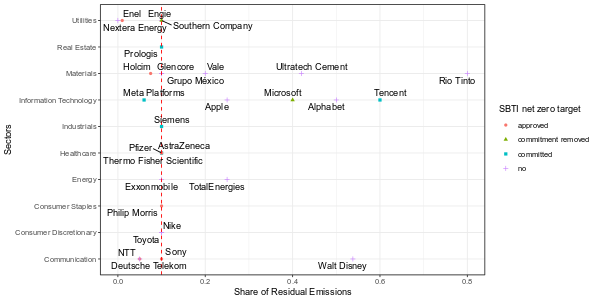A study from the University of Twente has revealed insights into the corporate world’s approach to achieving net-zero emissions. Only 22% of the companies with a net-zero target are committed to reducing emissions to a residual level and compensating with removals. “Companies like Meta use residual carbon emissions in their plans without defining correctly what that means”, says UT researcher Rosalie Arendt.
Residual carbon emissions are the ‘unavoidable’ emissions that remain after all possible actions have been taken. These emissions should be neutralised by removing the equivalent emissions from the atmosphere. Which emissions are considered unavoidable is now largely determined by corporations and technical experts, but it should be subject to political debate according to Rosalie Arendt, a researcher at the Faculty of Engineering Technology.
Assessing net-zero pledges
“Take the construction of houses, for example. It is technically possible to build a house out of wood, clay or natural stone. These are less CO2-intensive than cement and steel. Moreover, are the houses that are being built fulfilling people’s housing needs?”, asks Arendt. In her paper, she analysed the climate pledges of 115 large companies and found that only 69 had a net-zero target. Only 22% of these companies are actually committed to reducing emissions to a residual level and compensating with removals. In total, 28 companies provide a quantification of their residual emissions.
“Interestingly enough, sectors in which emissions are not unavoidable in general claim the most residual emissions”, says Arendt. IT corporations such as Microsoft, Tencent and Alphabet (Google), report having higher residual emissions on average, while they are not classified as hard-to-abate.

Figure 1: Reported residual emissions of the different companies, the dashed line is equal to the mean and the recommended level by the Science Based Target initiative (SBTi) for its cross-sector pathway
In her paper, Arendt calls for a collaborative approach to defining residual emissions, urging the involvement of governments and civil society actors in participatory processes at both national and international levels. This inclusive strategy aims to ensure ‘fair contributions’ towards the global climate effort, particularly in addressing the needs of the most vulnerable populations.
More information
Dr Rosalie Arendt is Assistant Professor in the Multidisciplinary Water Management research group (Faculty of ET). There she researches the policy evaluation of water and carbon compensation schemes. She published her research in an article, titled ‘Residual Carbon Emissions in Companies’ Climate Pledges: Who Has to Reduce and Who Gets to Remove?’, in the scientific journal Climate Policy. The article is open access and can be read online.





